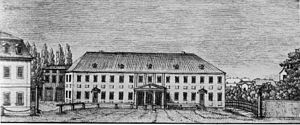Karl Ludwig Oels
Karl B. Ludwig Oels , also Carl Ludwig Oels (born October 3, 1771 in Berlin , † December 7, 1833 in Weimar ) was a German actor .
Live and act
Karl B. Ludwig Oels was born on October 3, 1771 in Berlin. Originally he was supposed to learn a trade. Oels rebelled against it until he was allowed to go to the stage. He made his first experience on stage in the Berlin lover's theater Urania , an association of like-minded educated citizens.
August Wilhelm Iffland , then a famous actor, writer and director since 1796, granted Oels free entry to the Royal Theater in Berlin . At the age of 30, Oels was given an engagement at the Bamberg Theater in 1801, which was last under the direction of Count Soden .
Beginnings at the Weimar court theater
In 1803 he came to the Weimar Court Theater , where he made his debut on February 14th in Poverty and Nobility in the role of Van der Hufen. At first he only got roles as a second lover, but then became a youthful hero and continued to be the first lover in drama and comedies, so that he could easily take on the roles of the famous Heinrich Voss . Oels was one of Johann Wolfgang von Goethe's students who took the matter seriously. On March 2, 1808, he played the judge Walter at the premiere of the comedy Der zerbrochne Krug by Heinrich von Kleist .
Through tireless diligence and a study that continued until the end of his life, Oels made ample replacement for the lack of scholarly training. Goethe praised Johann Peter Eckermann that Oels had a sufficiently higher education to do honor to better society. Friedrich Schiller, on the other hand, emphasized Oel's good memory and diligence in learning.
Appearance
Oels was also convincing in its external appearance. His manly beautiful body, his gorgeous curly hair and his lively eye captured the audience for him from the start. His voice also mastered the art of declamation , which was mainly emphasized in Weimar , but this was also a disadvantage when performing on so-called realistic stages outside of Weimar. When Genast the Elder resigned from his position as director in 1817 , Oels initially took his place on an interim basis.
roll
The roles that Oels occupied were unusually varied: as Mortimer, Arnold von Melchtal , Orest , Sigismund in Calderón's Das Leben ist ein Traum , Max in Wallenstein , Karl Moor , Egmont, Clavigo , Karl VII. In Jungfrau von Orleans, he accomplished afterwards According to the judgment of his contemporaries, his comedy characters were also highly valued by them. Towards the end of his acting career, he played hero fathers . His last major role was in the tragedy Friedrichs Tod by Ernst Raupach as the emperor. Oels was particularly close to this poet, who used to stay with him on his visits to Weimar.
End of his career
When his acting colleague and also Goethe's pupil Pius Alexander Wolff was buried on August 31, 1828 due to throat consumption and afterwards, Oels dedicated an obituary to him on the grave, with which he was connected not only to the ideal aspiration, but also to belonging to the Freemason order. Five years later, Oels died on December 7th, 1833, making him one of the last of Goethe's actors. His colleague Albert Lortzing drew his portrait in stone and Carl August Schwerdgeburth engraved him in full size as Muley in Steadfast Prince in copper.
Quotes
"Mr. Oels and Graff have sufficient higher education to honor the best of society."
“At the Alonzo,” I said, “we should have a stately figure, more of a good actor than singer, and I think Herr Oels or Herr Graff would be in the right place. By whom is the opera composed, and how is the music? "" By Reichardt, "answered Goethe," and the music is excellent ""
literature
- Ludwig Eisenberg : Large biographical lexicon of the German stage in the XIX. Century . Verlag von Paul List , Leipzig 1903, p. 737, ( Textarchiv - Internet Archive ).
- Karl Ludwig Oels , in: New Nekrolog der Deutschen , XI. Volume, 1833, pp. 796–799 ( digitized version )
- Johann Peter Eckermann : Conversations with Goethe . Volume III. 3. Edition. Leipzig 1868, p. 47
- E. Genast: From the life of an old actor . Leipzig 1862-1865. Pp. 163, 167, 178, 182, 192, 216, 283, 301 ff.
- Goethe, Schiller: Correspondence between Goethe and Schiller . Stuttgart 1881, No. 975, 979, 980, 982
- WG Gotthardi: Weimar theater images from Goethe's time . II. Jena and Leipzig 1865, pp. 52–56
- R. Herloßsohn, H.Margraff and others: General theater dictionary . Volume VI. New edition. Altenbuirg and Leipzig 1846, p. 18
- Hermann Arthur Lier: Oels, Karl B. Ludwig . In: Allgemeine Deutsche Biographie (ADB). Volume 24, Duncker & Humblot, Leipzig 1887, p. 319 f.
- M. Martersteig: Pius Alexander Wolff. A biographical contribution to the history of theater and literature . Leipzig 1879
- E. Pasqué: Goethe's theater management in Weimar . Volume II. Leipzig 1868, pp. 227, 306
- Hans Wahl, Anton Kippenberg: Goethe and his world . Insel-Verlag, Leipzig 1932
Web links
- Riemer's diary entry about Oels
- Document: Punishment against Oels wg. the refusal to "only" play as an extra
- Letter from Franz Passow to Johanna Victoria v. Voigt, Weimar, February 24, 1809 and mention of Oels
- Prologue Oels for Schiller Memorial Day 1817
| personal data | |
|---|---|
| SURNAME | Oels, Karl Ludwig |
| ALTERNATIVE NAMES | Oels, Karl B. Ludwig; Oels, Carl Ludwig |
| BRIEF DESCRIPTION | German actor |
| DATE OF BIRTH | October 3, 1771 |
| PLACE OF BIRTH | Berlin |
| DATE OF DEATH | December 7, 1833 |
| Place of death | Weimar |

